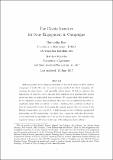Files in this item
The clarity incentive for issue engagement in campaigns
Item metadata
| dc.contributor.author | Basu, Chitralekha | |
| dc.contributor.author | Knowles, Matthew Paul | |
| dc.date.accessioned | 2018-01-15T15:30:07Z | |
| dc.date.available | 2018-01-15T15:30:07Z | |
| dc.date.issued | 2017-06-14 | |
| dc.identifier.citation | Basu , C & Knowles , M P 2017 ' The clarity incentive for issue engagement in campaigns ' . | en |
| dc.identifier.other | PURE: 252070346 | |
| dc.identifier.other | PURE UUID: bf3be685-2425-4ae7-88e7-115c1e9c8611 | |
| dc.identifier.uri | https://hdl.handle.net/10023/12479 | |
| dc.description.abstract | Although parties focus disproportionately on favorable issues in their election campaigns, it is also the case that parties spend much of the ‘short campaign’ addressing the same issues – and especially salient issues. If able to influence the importance of issues for voters through their emphasis, it is puzzling that parties spend any time on unfavourable issue positions. We suggest that while parties prefer to emphasize popular issue positions, they also face an additional incentive to emphasize issues that are salient to voters: clarifying their positions on these issues for sympathetic voters. Leveraging the surprise general election victory of the British Conservative party in 2015—which brought about a hitherto unexpected referendum on EU membership—we show that, consistent with this hypothesis, voter uncertainty is especially costly for parties on salient issues. We formalize this argument using a model of party strategy with endogenous issue salience. | |
| dc.format.extent | 29 | |
| dc.language.iso | eng | |
| dc.rights | Copyright (c)2017 the authors | en |
| dc.subject | JC Political theory | en |
| dc.subject.lcc | JC | en |
| dc.title | The clarity incentive for issue engagement in campaigns | en |
| dc.type | Working or discussion paper | en |
| dc.description.version | https://doi.org/Other | en |
| dc.contributor.institution | University of St Andrews. School of Economics and Finance | en |
This item appears in the following Collection(s)
Items in the St Andrews Research Repository are protected by copyright, with all rights reserved, unless otherwise indicated.

